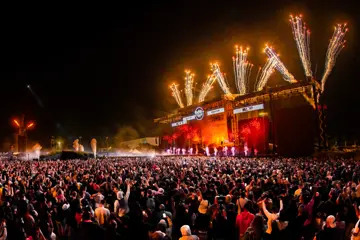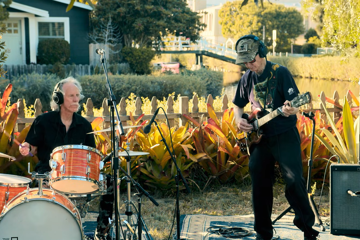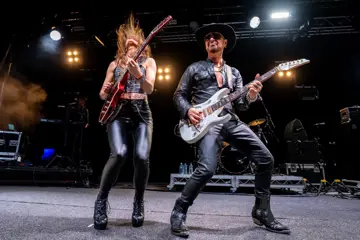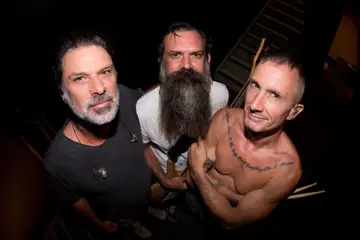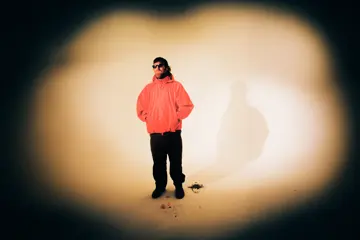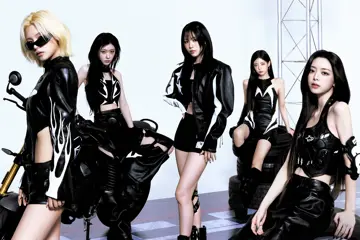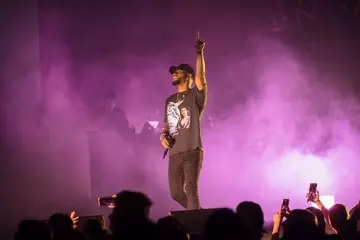ONLY THE BRAVE

Men at work. That’s the central, recurring theme of what’s become an unexpected American sub-genre: the real-life-tragedy movie. Landing in the middle-ground between popcorn-movie and prestige-pic — a place that Hollywood has, otherwise, essentially abandoned — these films trade on the ‘brand recognition’ of disasters, betting that enough eyeballs saw the widely-disseminated news-coverage that an in-built audience awareness exists, enough to put bums on seats. The courted market for these movies is, seemingly, working-class men in Southern US States, the films romanticising ball-busting pack-male banter, blue-collar grit and grind, and the honour of man who’s good at his job.
The recent rise of this sub-genre — think Peter Berg and Mark Wahlberg’s run of collaborations: Lone Survivor, Deepwater Horizon, and Patriots Day — means that Only The Brave feels familiar, sometimes even close to formula. It’s based on the real-life Granite Mountain Hotshots, a crew of firefighters in the Arizona desert. They’re literally men who play with fire, fighting wild blazes via firebreaks and burn-offs, routinely carrying out that paradox: starting fires to fight fires. Dirty, smelly, and cloaked in ash, they’re performing a thankless job, real-life heroes hoping to save lives whilst risking their own.
In these ranks, in this film, there’s a host of white men in moustaches, many of them who blend into the ensemble; save for Taylor Kitsch, bully turned bestie, boasting of sexual conquests; and Aussie Alex Russell, who’s always trying to get his crewmates to come watch his band (The Fire Lords!). Speaking of bands, the soundtrack — likely inspired by the listening-habits of the real-life crew — plays like a classic hard-rock station: Metallica, AC/DC, ZZ Top, Copperhead Road, Pearl Jam. It’s a masculine sound to go with its vision of masculinity: a troop drilled with militaristic zeal, all shirtless weightlifting and push-ups in the dirt.
Their leader, and sometime drill-sergeant, is Josh Brolin, who is one of the film’s twin leading men. He’s gruff, taciturn, folksy; a fire-whisperer who’ll talk to blazes — fires referred to as female — on distant hillsides, able to see how the weather will turn, where the flames will move. He’s shacked up, on a ranch, with Jennifer Connelly, his smarter/hotter other-half; the couple forever fighting and fucking, screenwriters Ken Nolan and Eric Warren Singer ginning the emotion by having them refer to each other by their pet-names in the opening scene. Connelly, as is the perpetual wont of the genre’s wife-at-home-who-worries (“it’s not easy sharing your man with a fire, I know,” says Andie MacDowell’s veteran wife-at-home-who-worries, in so many words), wants Brolin to spend more time at home. At home, she tends to rescue horses, this rehabilitation openly compared to that of the film’s other leading man, Miles Teller.
Don't miss a beat with our FREE daily newsletter
Teller plays a hopeless meth-head who, with the unexpected birth of a daughter, commits to cleaning himself up, doing right; the story of a person rising above their addictions forever catnip to a nation big on born-again evangelism. His dogged determination and self-sacrifice is forever lionised by the film; Teller going from outcast figure (“that kid’s a trainwreck!”) to its ultimate hero, the glittering example of the film’s romanticism of grunt-work, men proving their mettle through labour.
Whilst Brolin and Connelly get some great scenes of conflict, and Teller’s turn is big on physical transformation, Only The Brave, mostly, ia a picture of male-bonding and group dynamics; in which men we can’t quite tell apart chainsaw tree-limbs and bust balls, with occasional glimpses of their blonde wives and towheaded children a reminder of what they’re sacrificing, and evocative of the thematic consecration of ‘family’, be it literal or firefightin’ forged.
Director Joseph Kosinski — the special-effects wiz behind Tron: Legacy and Oblivion — largely shoots the film as handsome, sweaty, rural; his one favourite device, the Eye-of-God overhead, sometimes making for striking visions (as when we loom over top a helicopter sucking water up from a backyard pool). Whilst the film is about men who come face-to-face with wildfires, their control and command of fires, for much of the movie, neuters the threat. It’s only in its final, climactic, tragic iteration that you feel the true terror of a wildfire, its rapacious speed and destruction. Where other real-life-tragedy films revel in every detail of their tumultuous real-life event, in Only The Brave it’s over in a hurry, climax moving as fast as a wildfire. The film isn’t a taxonomy of tragedy, more sentimental shrine to lives lived and lost.
IN THIS CORNER OF THE WORLD

Here’s to soldiering on. In This Corner Of The World, a beloved Japanese manga previously adapted for TV, is given the grand animé treatment in director Sunao Katabuchi’s big-screen feature film. Set in the decade leading up to the atomic blast at Hiroshima, it’s a chronicle of the domestic life of a young woman, who leaves her family behind and marries some stranger in the neighbouring port city of Kure. Across two hours, she grits her teeth and greats every obstacle head-on; with good-natured humility and plucky perseverance. Whether that obstacle is leaving home to get married, learning what sex is (via creepy umbrella metaphor), a bitchy sister-in-law, sewing a kimono, stretching cooking ingredients thin in the face of wartime rations, building a bomb shelter, surviving a firebombing, getting ‘loaned out’ by your husband to a childhood friend as veritable comfort lady, or walking through the wasteland of razed Hiroshima.
The film —which, in its best moments, heads into flights of line-drawn fantasy, veritable anime impressionism— is a study in contrast, setting twee, folksy nostalgia for Japanese traditions and old-timey ways against the encroaching dread and vivid horrors of wartime bombings. Fumiyo Kono’s source-text is, in such, a study in innocence and innocence-lost: innocent people in an innocent time forced to reckon with cold, cruel reality when whole cities are laid waste, and their delusional Emperor admits defeat in a war previously built on sacrificial, suicidal belief and unimaginable zeal. Here, the poor families of the drama are clearly victims, but the film stops short of placing the blame for their sufferings —be they small or large, quotidian or eternal— on Japan, as nation. With its noble dedication to pressing on, In This Corner Of The World isn’t even, really, an anti-war film; instead, it’s a portrait of people going about their days, small figures caught in the tumult of grand history.
THE SECRET SCRIPTURE

“I want to hear your story, Rose,” says Eric Bana, one of a host of stars —he, Rooney Mara, Theo James, Vanessa Redgrave— trying on their "Irish through-and-through" accents in Jim Sheridan's The Secret Scripture. And with that, Redgrave, a spooked geriatric dame who’s spent her whole life in a mental institution, begins reading from the diary she scribbled in the margins of a bible. “January 4th, 1942,” Redgrave begins, and, lo!, here comes the dissolve, taking us back into a distant day where people wore hats and WW2 raged. Now, this Rose is a young Rooney Mara, crossing the border from Northern Ireland to the Republic, and living out her coming-of-age days as period-piece cliché: a headstrong, independent, thoroughly-modern woman... choosing between two men!
These men are symbols more than characters: one a rakish fighter-pilot, the other a glowering priest. One a Protestant, the other a dog-collared Catholic. One who’s enlisted to fight for the Brits, the other in bed with the parochial scoundrels who'll shoot a man for daring to. “Careful which side you choose!” snarls some local yokel, to Rooney-eats-it, letting her —and viewers!— know that this decision is important. But Sheridan, adapting a novel by Sebastian Barry, makes it plenty clear who she should chose: Jack Reynor’s dashing pilot all selfless sacrifice and casual shirtlessness, he the kind of man who can fix a radio, a motorcycle, the gutters, a woman with a compliment. James, on the contrary, plays a priest who’s certainly no Saint; he full of possessiveness, blackmail, and patriarchal condescension.
What results is a film bouncing back-and-forth between timeframes; between a softly-lensed matinée where Mara is condemned to the fate of a tragic heroine, suffering endlessly; and a present where Bana and Susan Lynch hang about a hospital eating Chinese take-out, reading from this ravings-of-a-possible-madwoman diary. With so many renditions of Moonlight Sonata you'll wish to never hear another.
It all builds up to a will-she-or-won’t-she revelation from the tragic past: Redgrave, back when she was a mere Mara of a girl, was condemned for murdering her baby, but, for all these years she’s denied doing so. The black/white morality of her symbolic paramours stands as a sure sign of where the film heads. And the final way-coincidental revelation is so ridiculous that it will, at the very least, make you laugh; providing some levity to offset the earnest slog of a middlebrow, mawkish, cut-rate-prestige-pic.



